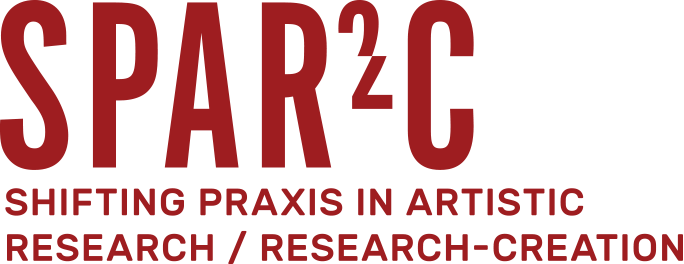October 22, 2021
2:00–3:30 pm MST
Panel
Research-Creation, Sound Studies, & Music Pedagogy
Captioning and ASL interpretation
Register at
Eventbrite
In the 21st century, post-secondary music departments are grappling with calls for a de-colonial attitude adjustment, including rethinking the reliance on the western classical cannon, assumptions about performance requirements and ensemble formulations, and expanded compositional training to include the many other forms of music that exist today. These calls include the need for engagement with local communities “in order to avoid the replication of normative systems of music education that merely include diverse content” (Robinson 2019). As music’s role has also expanded into the research-creation space, this panel will explore the role of music education and pedagogy in fostering these kinds of collaborations, in partial response to Dylan Robinson’s open letter to music educators.
Moderator:
Scott Smallwood - Associate Professor, Department of Music, University of Alberta
Presenters:
Jessie Beier - Sound Artist and Educator, PhD Candidate, Department of Secondary Education, University of Alberta
Emily Doolittle - Athenaeum Research Fellow, Royal Conservatoire of Scotland
Catlin W. Kuzyk - Composer, Sound-artist, Engineer, Music Educator
Shima Robinson - Poet and Spoken-word Artist, Master of Arts in Community Engagement (MACE) candidate, University of Alberta
Scott Smallwood is a sound artist, composer, and performer who creates works inspired by discovered textures and forms, through a practice of listening, field recording, and improvisation. In addition to composing works for ensembles and electronics, he designs experimental instruments and software, as well as sound installations and audio games, often for site-specific scenarios. Much of his work is often concerned with the soundscapes of climate change, and the dichotomy between ecstatic and luxuriating states of noise and the precious commodity of natural acoustical environments and quiet spaces. He performs as one-half of the laptop/electronic duo Evidence (with Stephan Moore) and teaches as an associate professor of composition at the University of Alberta, where he also serves as the director of the Sound Studies Institute.
Jessie Beier is a teacher, artist, writer, and conjurer of strange pedagogies for unthought futures. Working at the intersection of philosophy, artistic production, and radical pedagogy, Beier’s practice experiments with the potential for weird pedagogy to mobilize a break from orthodox referents and habits of repetition, towards more eco-logical modes of thought. Beier is currently a PhD Candidate in the Department of Secondary Education (University of Alberta) and an artist-researcher with the collaborative research-creation initiative Speculative Energy Futures (Future Energy Systems, University of Alberta). She has presented her work — through exhibitions, performances, public workshops, and conference/symposia — both locally and inter/nationally. She has published in a range of scholarly books and journals, and is currently completing a co-edited book titled Ahuman Pedagogy: Multidisciplinary Perspectives for Education in the Anthropocene (Palgrave Macmillan). For more information, visit jessiebeier.com.
Emily Doolittle is a Canadian-born, Scotland-based composer and researcher, with an ongoing interest in zoomusicology, the study of the music-like aspects of non-human animal song. Recent projects include the premiere of Reedbird, commissioned and performed by the Vancouver Symphony, the premiere of Bowheads, commissioned by Chamber Music Scotland for the Kapten Trio, and performances of her chamber opera Jan Tait and the Bear by Ensemble Thing at the Edinburgh Festival Fringe in the Made in Scotland Showcase, as well as the publication of her paper “Hearken to the Hermit Thrush”: A Case-Study in Interdisciplinary Listening in Frontiers in Psychology. She is an Athenaeum Research Fellow and Lecturer in Composition at the Royal Conservatoire of Scotland.
Catlin W. Kuzyk is an Amiskwaciwâskahikan-based (aka Edmonton, Alberta) sound artist; multi-instrumentalist; composer; producer; audio engineer and music educator. He is currently finishing a Bachelor of Music from MacEwan University specializing in audio recording and music production. Kuzyk is also Head Engineer and Tonmeister at Sublet Sound, a residential recording facility in Amiskwaciwâskahikan as well as founder of independent record label Darmok Records. His experience as music educator has indelibly impacted his continuing growth as an artist, helping to inform his professional and creative vision which centres itself around assisting others in realizing their creative dreams. By using tropes of popular music and culture in seemingly disorienting ways Kuzyk attempts to create something impactful through a process of constant exploration with a focus on being prolific rather than precious.
Shima Aisha Robinson works for APIRG on the University of Alberta campus as the Programming and Working Group Coordinator. She is a University of Alberta Master of Arts in Community Engagement (MACE) candidate who advances her enthusiasm for anti-oppression and social justice work volunteering, interning and working with local groups that address systemic issues of oppression and marginalization in amiskwaciy-wâskahikan (aka Edmonton). Shima is an amiskwaciy-wâskahikan (aka Edmonton) born poet and spoken word artist who embodies, with every literary and scholarly effort, the ancient meaning of her chosen pen name. Dwennimmen is the name of an ancient African Adinkra symbol, which means strength, humility, learning and wisdom.



